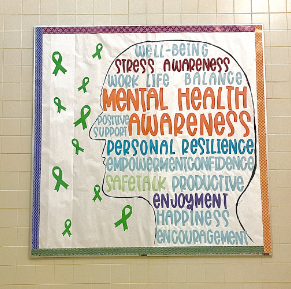May is a time to highlight mental health issues and the overall well-being of yourself and those around you. During this month, many advocates promote self-care, coping strategies, and empathy for those who may be or actively are suffering.
To Oakdale health teacher Joan James, mental health is an important and growing concern. Especially in the younger generation due to factors like the recent pandemic and social media. With these rapid changes, many students have been affected negatively and are unsure how to cope with these emotions.
“Many times, people feel that if they admit they have poor mental health or are suffering from a mental illness, they will be perceived as crazy, or others will not understand what they are going through and label them as ‘just being sad’ or ‘going through a phase’. Especially at the high school level, many students could just be labeled as being a ‘moody teenager’. Asking for help and being able to reach out and talk to a medical professional can be extremely intimidating,” James communicated.
When it comes to mental health, it’s hard for a lot of people to get help due to misconceptions. To James, some of the biggest signs of declining mental health are social isolation, having more bad days than good days, and no longer finding things you once loved enjoyable.
“It’s very important that students have healthy coping mechanisms to deal with mental health,” James emphasized. So when James and her class talk about mental health, they practice different coping strategies.
“Exercise is a GREAT way to improve one’s mental health because physical activity releases natural endorphins in the body that react with our dopamine receptors. There is also journaling, meditation, drawing, and painting. A lot of students have expressed that certain music helps them relax, and they find an increase in their mood,” James informed.
In support of each other, “We can stop breaking each other down and being so negative. If someone has a different opinion or belief than you, it doesn’t mean you have to tear them apart, and you have to be enemies. We (as a society) need to learn to support each other,” James clarifies.
An anonymous student shared that they personally help their friends by telling them that they are “cared for and that they matter.”
As well as explaining, “When they are down, I try to pull them out of whatever funk they are feeling by telling a funny joke. If I don’t know what to do, just being there helps a lot.”
The student also maintains their mental health during the school year by reminding themselves of the opportunities they have and practicing gratitude for them. They remind themselves of how everything they are doing in school can benefit them in the long run. No matter how bad things get, they can always make a change. Not just to themselves, but to the world just by being here and contributing themselves. Nothing can replace that.
As we continue to navigate the complexities of mental health in May, we should continue to foster healthy coping mechanisms, advocacy, and support so all individuals feel empowered to keep going strong.





























